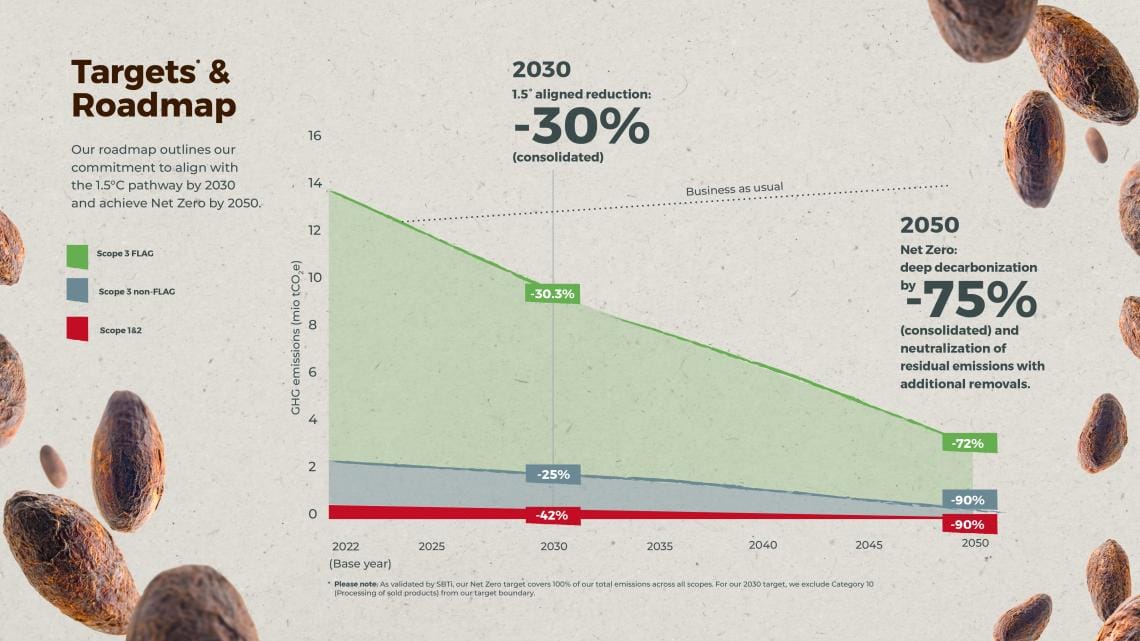The company said the fresh initiative aligns with worldwide efforts to limit global warming to 1.5 degrees Celsius and the launch of its Net Zero Roadmap, is a pivotal step in the company's ongoing commitment to sustainability.
“At Barry Callebaut, we believe protecting our climate is not just a responsibility but essential for the future of our business. We have been addressing climate change since 2016, and we are proud to launch our Net Zero Roadmap, a pivotal step in our sustainability journey. Now, we are ready to turn these ambitious plans into action, hand in hand with our customers,” said Peter Feld, CEO of Barry Callebaut.
The move follows a previous commitment in 2016 to reduce its carbon footprint across all operations. Since then, Barry Callebaut claims it has achieved significant milestones in its sustainability journey. In 2019, the company became the first to receive SustainCert certification for carbon removals from agroforestry, in line with its strategy of becoming forest-positive by 2025.
Building on this foundation, in 2023, Barry Callebaut announced its commitment to reach Net Zero by 2050, with interim targets for 2030 aligned with the Paris Agreement.
This commitment, outlined in a Net Zero Roadmap published on the company’s website, demonstrates the company is moving forward with its decarbonization efforts to address the urgent challenges of climate change.
Barry Callebaut believes that sustainability is essential not only for the planet but also for the long-term success of its business as it strives to make sustainable chocolate the norm.

The roadmap identifies more than 30 reduction levers across five key areas with a strong focus on value chain emissions. Activities include accelerating the switch to renewable energy at Barry Callebaut’s production sites, utilizing biofuels and electric vehicles in transportation, engaging with suppliers, and implementing low-carbon agricultural practices such as agroforestry and other regenerative methods.
The company said in a statement that these initiatives will drive its efforts to meet its 2030 and 2050 targets.
A Call to Action in Partnership
Barry Callebaut also states that achieving these targets requires collaboration across the entire value chain. The company is working closely with its customers, suppliers, and partners to implement sustainable practices and share the responsibility of reducing emissions.
"We aim to become the world’s leading provider of Net Zero chocolate solutions," said Feld.
The CocoaRadar View on Offsetting Carbon Footprints in the Cocoa Sector
The cocoa sector has a significant carbon footprint, with the largest contributors being cocoa and dairy farming. Both activities are resource-intensive, involving land-use changes, high energy consumption, and considerable greenhouse gas emissions. As climate change accelerates, the need to mitigate the environmental impacts of cocoa production becomes more pressing. The carbon intensity of cocoa farming is primarily driven by deforestation and unsustainable agricultural practices. Clearing forests for cocoa plantations releases stored carbon dioxide, contributing to climate change.
Solution
To effectively offset its carbon footprint, the industry must adopt more sustainable practices, embrace innovation, and strengthen collaboration. Sustainable farming practices like agroforestry—where cocoa is grown alongside trees—can help capture carbon and maintain biodiversity. This approach reduces deforestation, improves soil health, conserves water, and enhances resilience to climate change.
Conclusion: A Collective Responsibility
The cocoa sector stands at a crucial juncture. While significant progress has been made in some areas, there is much more to do to offset its carbon footprint. The industry can make strides toward a more sustainable future by embracing sustainable farming practices, decarbonizing dairy production, optimizing supply chains, and investing in innovative solutions. Stakeholders across the value chain, from farmers to consumers, must commit to this journey, recognizing that climate action in the cocoa sector is a moral imperative and essential for the industry's long-term viability.

